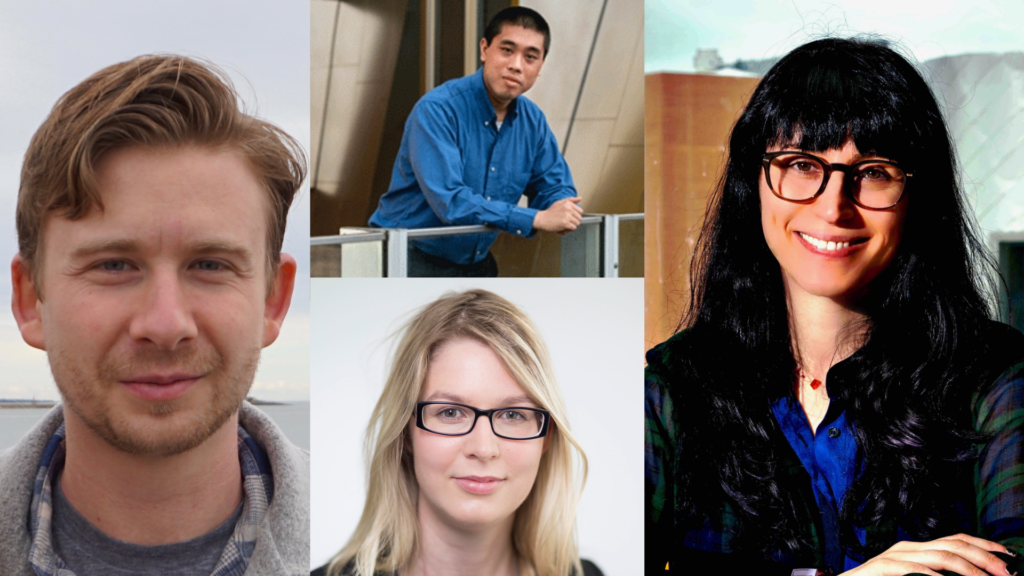Department of EECS Announces 2024 Promotions
 Clockwise from top: Julian Shun, Manya Ghobadi, Stefanie Mueller, Adam Belay. All photos courtesy their subjects.
Clockwise from top: Julian Shun, Manya Ghobadi, Stefanie Mueller, Adam Belay. All photos courtesy their subjects. The Department of Electrical Engineering and Computer Science (EECS) is proud to announce the following promotions to associate professor with tenure. All will be effective July 1, 2024:
Adam Belay earned his BS and MEng at MIT in 2008 and 2011, respectively, and his PhD at Stanford in 2016. He spent a year as a Software Engineer at Google before joining MIT in July 2017. A principal investigator in CSAIL, Belay’s research focuses on operating systems and networking, with an interest in developing practical and efficient methods for microsecond-scale computing. This has many applications pertaining to efficiency and performance in data centers. For example, his work on Caladan significantly speeds up server resource allocation, unlocking the ability to maintain both high CPU utilization and low tail latency. Additionally, Belay has worked on storage virtualization at VMware and has contributed substantial code to the Linux Kernel.
Among other honors, Belay has served on multiple program committees, including OSDI (2021-4), NSDI (2023-4), SOSP (2021, 2023), Eurosys (2019, 2022), and USENIX ATC 2019, and has received the OSDI Jay Lepreau Best Paper Award, a Sloan Research Fellowship, and multiple research awards from Google and Meta.
Manya Ghobadi earned her bachelor’s degree from the Sharif University of Technology in 2005, followed by her M.Sc. from the University of Victoria in 2007, and her PhD from the University of Toronto in 2013. She then worked at Google as a software engineer and at Microsoft as a researcher, before joining EECS as an Assistant Professor in October 2018. A principal investigator within CSAIL, Ghobadi’s current research interests are centered on building efficient network infrastructures that optimize resource use, energy consumption, and high availability. She is considered the leading expert in networks with reconfigurable physical-layer, and many of the networks she has helped develop are part of real-world systems at Microsoft and Google.
Her work has been recognized by the Sloan Fellowship in Computer Science, ACM SIGCOMM Rising Star award, ACM-W Rising Star Award, NSF CAREER award, a Sloan Fellowship in Computer Science, the first Optica Simmons Memorial Speakership award, and best paper awards at the Conference on Machine Learning and Systems (MLSys) and ACM Internet Measurement Conference (IMC).
Stefanie Mueller earned her Bachelor’s degree from the University of Applied Science Harz in 2010, and her MSc and her PhD from the Hasso Plattner Institute, in 2013 and 2016, respectively, before joining MIT EECS, joint with MIT MechE. Mueller is the lead of the Human Computer Interaction (HCI) Engineering group at MIT CSAIL; in her research, she develops novel hardware and software systems that leverage innovations in hardware, materials, and computational algorithms to give objects new capabilities. Among other applications, her lab creates prototype health sensing devices and electronic sensing devices for curved surfaces; embedded sensors; fabrication techniques that are trackable via invisible marker; and objects with reprogrammable and interactive appearances.
Among many other honors, Mueller has been recognized with the MIT Technology Review ‘Innovators Under 35’ 2022, Microsoft Research Faculty Fellowship and Alfred P. Sloan Research Fellowship, an NSF Career Award, and the Forbes 30 Under 30 in Science.
Julian Shun earned his BA at UC Berkeley in 2008, and his MS and PhD from Carnegie Mellon in 2012 and 2015, respectively. After a postdoctoral stint at UC Berkeley, he joined MIT EECS as an Assistant Professor in 2017. A principal investigator in CSAIL, Shun’s research focuses on the theory and practice of parallel and high-performance computing, including designing algorithms and high-level programming frameworks for graphs, spatial data, and dynamic problems.
Among many other honors, Shun has been awarded the DOE Early Career Award, the NSF Career Award, the Google Faculty Research Award and Google Research Scholar Award, the SoE Ruth and Joel Spira Award for Excellence in Teaching, and the Allen Newell Award for Research Excellence.
Media Inquiries
Journalists seeking information about EECS, or interviews with EECS faculty members, should email eecs-communications@mit.edu.
Please note: The EECS Communications Office only handles media inquiries related to MIT’s Department of Electrical Engineering & Computer Science. Please visit other school, department, laboratory, or center websites to locate their dedicated media-relations teams.